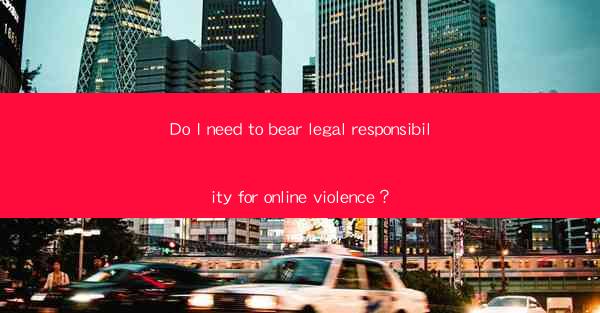
The article delves into the question of whether individuals need to bear legal responsibility for online violence. It explores various aspects of online violence, including its definition, types, and the legal implications. The article discusses the importance of accountability, the challenges in enforcing online laws, and the role of social media platforms in preventing online violence. It concludes by emphasizing the need for a comprehensive approach to address online violence and the legal responsibilities that individuals may have in such situations.
Introduction
Online violence has become a significant concern in today's digital age. With the increasing use of the internet and social media, instances of cyberbullying, harassment, and hate speech have surged. The question of whether individuals need to bear legal responsibility for online violence is a complex one, involving legal, ethical, and social considerations. This article aims to explore this issue from multiple perspectives, providing a comprehensive understanding of the legal implications of online violence.
Definition and Types of Online Violence
Online violence refers to any form of aggression, harassment, or harm that occurs online. It can take various forms, including cyberbullying, online harassment, hate speech, and cyberstalking. Understanding the different types of online violence is crucial in determining the legal responsibilities associated with such actions.
-Cyberbullying
Cyberbullying involves the use of digital communication to harm, intimidate, or humiliate another individual. It can occur through social media, messaging apps, or online forums. The legal responsibility for cyberbullying depends on the severity of the offense and the jurisdiction in which it occurs. In many cases, cyberbullies can be held legally responsible for their actions, especially if they cause significant harm to the victim.
-Online Harassment
Online harassment is a persistent pattern of unwanted behavior that causes fear, alarm, or distress. It can include sending threatening messages, spreading false information, or posting offensive content. Legal responsibility for online harassment can vary, but it often depends on the intent and impact of the harassment. In some cases, online harassers may face criminal charges, particularly if their actions constitute stalking or harassment under local laws.
-Hate Speech
Hate speech refers to any communication that promotes hatred or discrimination against individuals or groups based on race, religion, ethnicity, or other characteristics. While hate speech is generally protected under freedom of expression laws, there are exceptions when it incites violence or poses a direct threat. In such cases, individuals responsible for hate speech may be held legally responsible.
Legal Implications and Responsibilities
Determining legal responsibility for online violence involves several factors, including the nature of the offense, the jurisdiction, and the availability of relevant laws.
-Severity of the Offense
The severity of the online violence is a crucial factor in determining legal responsibility. Acts that cause significant harm, such as cyberstalking or online harassment resulting in physical harm, are more likely to lead to legal consequences. Conversely, minor offenses may not attract legal action unless they are part of a broader pattern of behavior.
-Jurisdiction
The jurisdiction in which the online violence occurs plays a significant role in determining legal responsibility. Different countries have varying laws and regulations regarding online behavior, making it challenging to enforce legal actions across borders. This can create legal gray areas and make it difficult to hold individuals accountable for their actions.
-Availability of Relevant Laws
The existence of specific laws addressing online violence is essential in determining legal responsibility. Many countries have enacted legislation to combat cyberbullying, online harassment, and hate speech. However, the enforcement of these laws can be challenging, and gaps in legislation may leave individuals with limited legal responsibilities.
Role of Social Media Platforms
Social media platforms play a significant role in the spread of online violence. They have a responsibility to monitor and regulate user behavior to prevent and address online violence.
-Platform Policies
Social media platforms have developed policies to address online violence, including guidelines for reporting and removing harmful content. These policies vary across platforms and may not always be effective in preventing or addressing online violence.
-Enforcement Mechanisms
Social media platforms employ various enforcement mechanisms to address online violence, such as automated systems for detecting and removing harmful content. However, these mechanisms are not foolproof and may fail to identify or address severe cases of online violence.
-Collaboration with Law Enforcement
Social media platforms often collaborate with law enforcement agencies to investigate and take action against individuals responsible for online violence. This collaboration is crucial in holding individuals accountable for their actions and ensuring that victims receive appropriate support.
Conclusion
The question of whether individuals need to bear legal responsibility for online violence is a multifaceted issue. It involves understanding the different types of online violence, the legal implications, and the role of social media platforms. While legal responsibility for online violence exists, the enforcement of these laws can be challenging due to jurisdictional and legislative gaps. A comprehensive approach, involving both legal and social measures, is necessary to address online violence effectively and hold individuals accountable for their actions.











